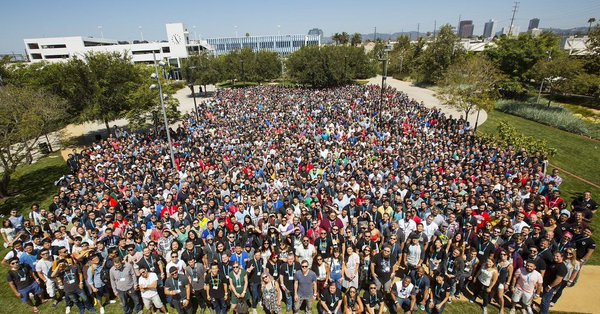Riot Games commits to 'seven steps' to drive cultural change around sexism and harassment
The League of Legends studio issued an extensive apology for its past behavior and committed to major changes going forward.

Three weeks after an in-depth Kotaku report on workplace sexism, harassment, and general toxicity, League of Legends developer Riot Games has issued a statement apologizing to current, former and prospective employees and contractors, and promising extensive changes to its "cultural DNA" that will "leave no room for sexism or misogyny."
"We're sorry that Riot hasn’t always been—or wasn’t—the place we promised you. And we’re sorry it took so long for us to hear you. In the days, weeks, months, years to come, we’re going to make Riot a place we can all be proud of," the studio said.
"To people considering a career at Riot: We understand if you have some doubt or hesitation. But we also need you now more than ever. We need people who will drive change and fight for what’s right. Building Riot wasn’t easy. Rebuilding it won’t be either. But the promise of Riot’s future is stronger than ever and if you’re up for being part of the solution, we want to meet you."
Fans and "partners" are included in the apology as well: "We know that the studio behind a game can be an important part of how you feel about that game. We know we’ve let you down and we’re committed to fixing that."
We’re doubling down on educating all Rioters about creating an inclusive environment. We’re setting off on a long journey and we’ll update you along the way. Nothing is off limits. We aren’t afraid of what we’ll lose in the process—we only look forward to what we’ll gain.August 29, 2018
The apology is followed by a rundown of seven "first steps" that Riot said will help drive changes to its culture while maintaining its unique positive qualities. At the top of the list is an expansion of the studio's "Culture and D&I [Diversity and Inclusion] Initiative," which will be directly accountable to the CEO; it will also examine its "cultural definitions," including the using of language and specific terms, "to ensure they mean the same thing to all of us." External consulting companies have been engaged to guide the process, and the internal investigation system is being beefed up.
Training, at all levels, will also be a focus. "Trainings that had been specific to managers are being expanded to all Rioters, including interview training and anti-harassment training. We’re also investing in anti-bias training to encourage behaviors that foster a fair and inclusive work environment," Riot said. "In addition, we are investing in management training for all managers to build and support better teams. These trainings will be required for existing Rioters, with elements integrated into our Rioter onboarding program."
It's fair (and obvious) to say that promises are easy, and mission statements are just ink on paper: What will matter is what Riot actually does going forward. But one point, under its breakdown of the "Investigation Process," suggests that the studio is serious: "We are prepared to make big changes and have begun taking action against specific cases, including removal of Rioters, though we aren't likely to get into those details publicly on a case-by-case basis for legal and privacy reasons."
The biggest gaming news, reviews and hardware deals
Keep up to date with the most important stories and the best deals, as picked by the PC Gamer team.
In the wake of Kotaku's report, former Riot community programs specialist Meagan Marie wrote that "an unacceptable number of people—primarily, but not exclusively women—have been subject to inappropriate behavior at Riot for years" in a post titled "Six months at Riot Games." This week, a post from former Riot product management director Barry Hawkins titled "The story of why I left Riot Games" added further evidence that the changes Riot is now striving for are long overdue.

Andy has been gaming on PCs from the very beginning, starting as a youngster with text adventures and primitive action games on a cassette-based TRS80. From there he graduated to the glory days of Sierra Online adventures and Microprose sims, ran a local BBS, learned how to build PCs, and developed a longstanding love of RPGs, immersive sims, and shooters. He began writing videogame news in 2007 for The Escapist and somehow managed to avoid getting fired until 2014, when he joined the storied ranks of PC Gamer. He covers all aspects of the industry, from new game announcements and patch notes to legal disputes, Twitch beefs, esports, and Henry Cavill. Lots of Henry Cavill.

